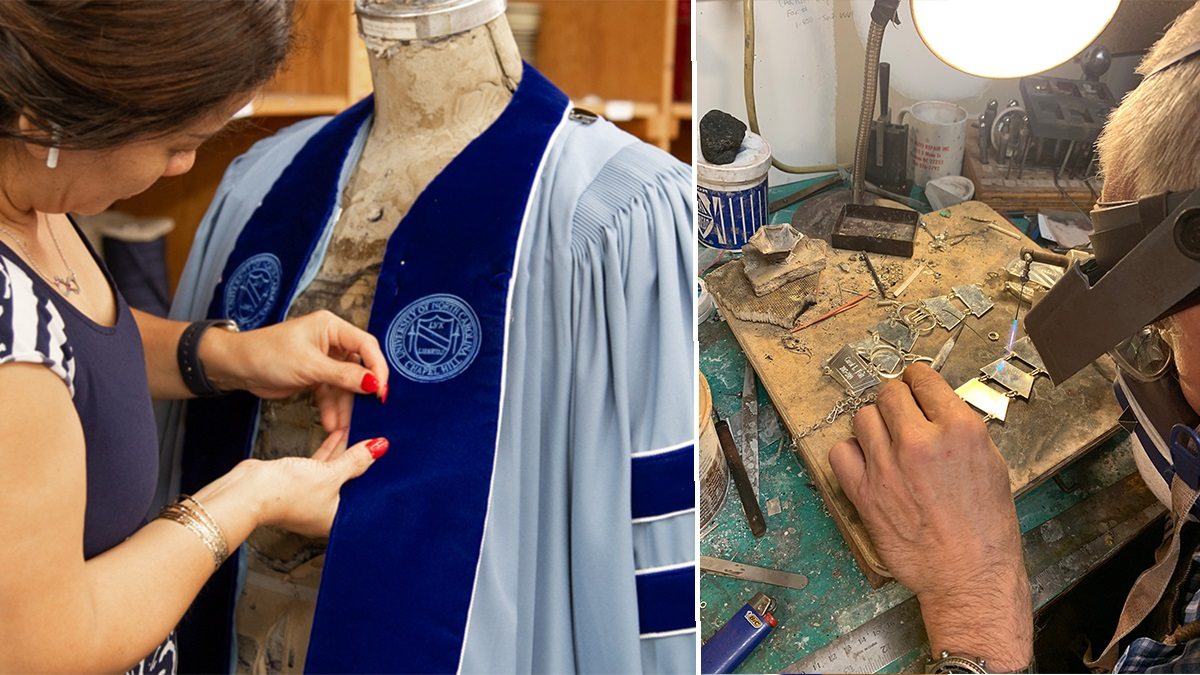A new take on tradition
Chancellor Kevin M. Guskiewicz’s installation ceremony on Sunday will feature Carolina traditions with a few modifications due to the pandemic.

Carolina will officially install its 12th chancellor on Sunday with a ceremony of modified traditions due to extraordinary times.
The first chancellor’s installation ceremony in 1957 set a precedent for all subsequent celebrations. William Brantley Aycock’s installation featured a ceremony for faculty, staff and students, a procession of faculty across campus and greetings from campus groups. Traditions grew over the years: ringing South Building’s bell after the ceremony, swearing the oath of office using North Carolina’s oldest family Bible and presenting the chancellor’s medallion.
On Sunday, the ceremony will be greatly scaled back to adhere to community safety standards. There will be no procession of faculty, and greetings from across campus and the state will be virtual. The ceremony is closed to the public, and interactions on stage will be limited. Despite these limitations, the remaining traditions and virtual adaptions will help the Carolina community recognize the past and look toward the future.
Setting a precedent
Aycock, the first chancellor to be formally installed, was actually the second chancellor of the University. The first chancellor, Robert House, was dean of the University for 11 years before UNC System President Frank Porter Graham named him chancellor. House hoped to get a pay raise but was instead promoted to a new title for a position he already held, according to the Carolina Alumni Review.
A dozen years after House’s promotion, the University celebrated Aycock’s installation in Kenan Memorial Stadium. Classes were canceled to allow students to attend. A procession of faculty led the way to the stadium, where North Carolina Gov. Luther Hodges presided over the ceremony, and the state’s Supreme Court Chief Justice administered the oath of office. The president of the student body, president of the alumni association, a Board of Trustees member and a faculty representative all greeted Aycock, acknowledging him as the new chancellor. Notably, even in 1957, the installation was televised.
This first installation started the traditions of a campus procession by faculty, formal greetings by a select cohort and an oath administered by a high-ranking North Carolina judge. But, more traditions were added over the years leading up to Guskiewicz’s installation.
Traditions old and new
On Sunday, Guskiewicz will take his oath of office as chancellor with his hand on The Durant Bible, North Carolina’s oldest family Bible. Englishman George Durant carried the Bible, printed in 1599, with him when he immigrated to America in 1658 and settled in what became Perquimans County in eastern North Carolina. The Durant Bible was passed down through the family until it was obtained by Rev. Charles Deems for the North Carolina Historical Society sometime between 1844 to 1857. The Durant Bible found a permanent home at Carolina’s Louis Round Wilson Library in 1929, where it is part of the North Carolina Collection.
The leatherbound Bible was first used in an installation ceremony for former Chancellor Carol Folt in 2013, but it has also been used to swear in North Carolina governors and UNC System presidents.
Though it looks like a historic relic, the chancellor’s medallion has only been an installation tradition since 1995. Donated to the University during Carolina’s 1993 bicentennial observance by John Sanders, professor emeritus and a former director of the Institute of Government, the medallion originally hung from a white ribbon. Years of wear necessitated its replacement, and in 2013 a sterling silver chain of rectangles was forged and engraved with the names and dates of service of all previous chancellors. The chain also contains links in the shape of the Old Well and leaves from the Davie Poplar. The medallion itself portrays the seal of the University and its motto, “Lux, Libertas,” meaning “Light and Liberty.”
Traditionally, the medallion is presented and placed on the chancellor by the University of North Carolina System president. This year, due to social distancing and community guidelines, UNC System President Peter Hans will officially present the medallion to Guskiewicz, and the chancellor’s wife, Amy Guskiewicz, will place it around her husband’s neck.
The bell in South Building is rarely used, but on Sunday, it will ring to honor Guskiewicz as Carolina’s new chancellor. A bell was first added to the cupola of South Building in the early 1800s and was rung by the building’s custodian to signal class changes every day. The bell was automated in the 1930s but is now only rung for special occasions, such as the installation of a new chancellor or the memorial service of a previous chancellor. The bell in South Building will be rung 12 times on Sunday to signify Guskiewicz’s installation as the University’s 12th chancellor.
Further modifications
Greetings from North Carolina Gov. Roy Cooper, Faculty Chair Mimi Chapman and Student Body President Reeves Moseley, among others, have been pre-recorded and will be played during the ceremony. In the absence of a faculty procession, Faculty Marshal Patricia S. Parker will provide the installation’s opening remarks.
As in 1957, the ceremony will be broadcast, but this time on the University’s YouTube channel and also streamed on installation.unc.edu. Guskiewicz will still place his left hand on The Durant Bible, but U.S. District Court Judge Richard E. Myers II will stand 6 feet away while swearing him into office. Past installations have featured live performances of “Hark the Sound.” Those in attendance and those watching online will still hear Carolina’s beloved alma mater, only this year it will be a pre-recorded version.
Though Sunday’s ceremony may look different from past installations, it will be no less historic. As Carolina gains its 12th chancellor and 32nd leader, it will be a day to reflect on tradition while resolutely facing the future.




